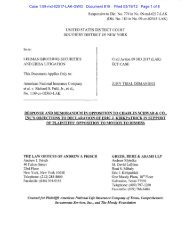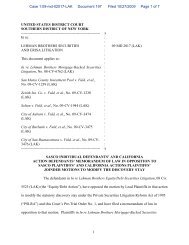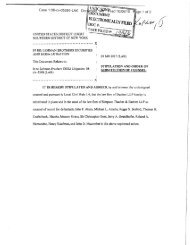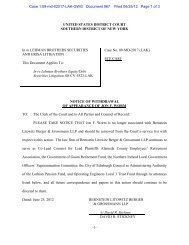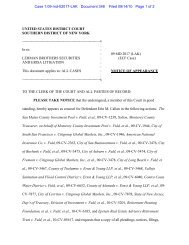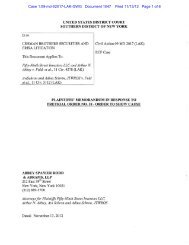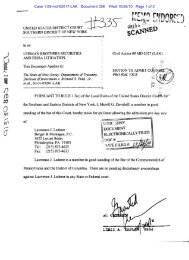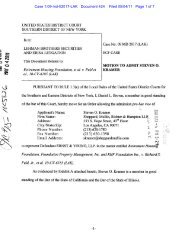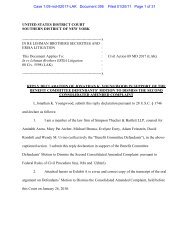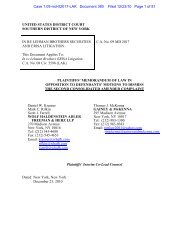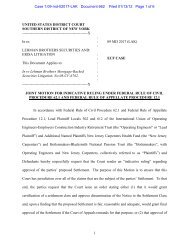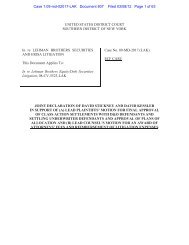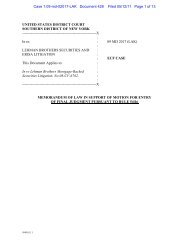Third Amended Complaint - Lehman Brothers Securities Litigation
Third Amended Complaint - Lehman Brothers Securities Litigation
Third Amended Complaint - Lehman Brothers Securities Litigation
You also want an ePaper? Increase the reach of your titles
YUMPU automatically turns print PDFs into web optimized ePapers that Google loves.
105 transactions, “[c]onsequently, <strong>Lehman</strong>’s statement that the net leverage ratio was a ‘moremeaningful’ measurement of leverage was rendered misleading because that ratio – as reported by<strong>Lehman</strong> – was not an accurate indicator of <strong>Lehman</strong>’s actual leverage, and in fact, understated<strong>Lehman</strong>’s leverage significantly.”34. In addition, <strong>Lehman</strong>’s public statements regarding its liquidity (the immediate abilityto access funds to pay down short-term obligations) was rendered materially misleading because itsfinancial statements and related footnote disclosures failed to disclose <strong>Lehman</strong>’s immediateobligation to repay tens of billions of dollars in Repo 105 transactions just days after the end of eachfiscal quarter. Thus, <strong>Lehman</strong>’s reported that short-term or current liabilities were similarlyunderstated by a material amount. As a result, <strong>Lehman</strong> did not have nearly as much in availableliquidity or in its liquidity pool as it represented.35. <strong>Lehman</strong> also issued materially false and misleading explanations in theManagement’s Discussion and Analysis (“MD&A”) section of its periodic reports relating to therationale behind the reported decreases to its net leverage ratio (either quarter-on-quarter orcomparing to the prior year’s same quarter to the reported quarter). Regardless of theappropriateness of <strong>Lehman</strong>’s accounting for its Repo 105 transactions under GAAP, theserepresentations were materially false and misleading because <strong>Lehman</strong> was contractually obligatedto repurchase the Repo 105 assets.36. Significantly, a Repo 105 transaction was a more expensive form of short-termfinancing than an Ordinary Repo. <strong>Lehman</strong> had the ability to conduct an Ordinary Repo transactionusing the same securities and with substantially the same counterparties, at a lower cost, but insteadengaged in Repo 105 transactions that had the effect of temporarily “removing” tens of billions ofdollars of assets off <strong>Lehman</strong>’s balance sheet at the end of each quarter.37. At bottom, <strong>Lehman</strong>’s Repo 105 transactions lacked economic substance, and<strong>Lehman</strong>’s reported de-leveraging failed to reflect its true financial condition. The quarterly cycle oftemporarily “removing” as much as $50 billion of assets off its balance sheet (as reflected in Table 1-10-



